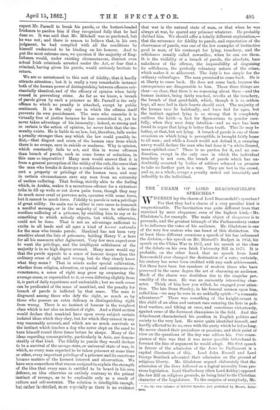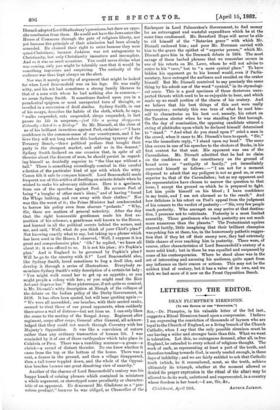THE CHARM OF LORD BEACONSFIELD'S SPEECHES.*
WHEREIN lay the charm of Lord Beaconsfield's speeches? For that they had a charm of a very peculiar kind is unquestionable. The fascination was quite different from that
exercised by mere eloquence, even of the highest kind,—Mr. Gladstone's, for example. The main object of eloquence is to
persuade, and the greatest triumph of the Parliamentary orator is to influence the votes of his audience. Mr. Gladstone is one of the very few orators who can boast of this distinction. On at least three different occasions a speech of his has influenced the division,--his speech on Mr. Disraeli's Budget in 1852, his speech on the China War in 1857, and his speech at the close of the debate on his own Irish University Bill in 1873. It is probable, on the other hand, that no speech from Lord Beaconsfield ever changed the destination of a vote; certainly, his oratory has never been credited with any such achievement. Yet there have been few speakers of modern times who have possessed in the same degree the art of charming an audience. Much of the charm was doubtless due to the singular per. sonality of the man. He was an eminently interesting char- acter. Think of him how you willed, he engaged your atten- tion. The late Dean Stanley, in his funeral sermon upon him, called him—we may be sure in no unkindly spirit—" a romantic adventurer." There was something of the knight-errant in this child of an alien and outcast race entering the lists in poli- tical warfare, and tilting at once, and sometimes victoriously, against some of the foremost champions in the field. And this detachment characterised his position in English politics and society to the very last. He never quite identified himself, and hardly affected to do so, even with the party which he led so long. He never shared their prejudices or passions, and their point of view on the questions of the day was seldom his. One conse- quence of this was that it was never possible beforehand to forecast the line of argument he would adopt. His first speech in favour of the admission of the Jews to Parliament is a capital illustration of this. Lord John Russell and Lord George Bentinck advocated their admission on the ground of religious liberty. Mr. Gladstone argued elaborately that the admission of the Jews followed as a logical necessity from pre- vious legislation. Lord Shaftesbury (then Lord Ashley) opposed the Jew Bill on religious grounds, as being fatal to the Christian character of the Legislature. To the surprise of everybody, Mr.
5ee the two volumes of Selected Speeches, just published by Messrs. Long- maa-
Disraeli adopted Lord Shaftesbury's premisses, but drew an oppo- site conclusion from them. He would not have the Jews enter the House of Commons through the gate of religious liberty, nor yet because the principle of their admission had been already conceded. He claimed their right to enter because they were quasi-Christians ; because Judaism was not antagonistic to Christianity, but only Christianity immature and incomplete. And so it was on most occasions. You could never divine what was coming, only you might be tolerably sure that it would be something ingenious and surprising. The curiosity of the audience was thus kept always on the alert.
Nor was it merely novelty of argument that might be looked for when Lord Beaconsfield was on his legs. He was really witty, and his wit had sometimes a strong family likeness to that of a man with whom he had nothing else in common,— we mean Sydney Smith. It sometimes flashed upon you in a paradoxical epigram or most unexpected turn of thought, or revelled in a succession of droll similes. Sydney Smith, in one of his essays, describes the habits of the sloth, which, he says, "walks suspended, eats suspended, sleeps suspended, in fact passes its life in suspense,—just like a young clergyman alistant2y related to a Bishop." So Mr. Disraeli, at the close of ne of his brilliant invectives against Peel, exclaims :—" I have confidence in the common-sense of our countrymen, and I be- lieve they will not long endure this huckstering tyranny of the Treasury Bench,—tho:e political pedlars that bought their party in the cheapest market, and sold us in the dearest." Sydney Smith declared on one occasion that, in spite of all theories about the descent of man, he should persist in regard- ing himself as decidedly superior to "the blue ape without a tail." There is something exceedingly comical in this careful selection of the particular kind of ape with which the witty Canon felt it safe to compare himself. Lord Beaconsfield made frequent use of this artifice of dwelling on minute details when he wished to make his adversary ridiculous. Here is a specimen, from one of the speeches against Peel. He accuses Peel of being "a burglar of other men's ideas," and of having "found the Whigs bathing, and run away with their clothes." Nor was this the worst of it; the Prime Minister had condescended to borrow his policy even from obscure "pedants." "Why, Sir, these are matters of general notoriety. After the day that the right honourable gentleman made his first ex- position of his schemes, a gentleman well known to the House, and learned in all the political secrets behind the scenes, met me, and said, ' Well, what do you think of your Chief's plan ?' Not knowing exactly what to say, but taking up a phrase which has been used in the House, I observed, Well, I suppose it is a great and comprehensive plan." Oh !' he replied, we know all about it ; it was offered to us. It is not his plan ; it's Popkin's plan: And is England to be governed by Popkin's plan ? Will he go to the country with it ?" Lord Beaconsfield also, like Sydney Smith, loved sometimes to hug a droll idea, and develop it through a series of illustrations. Everybody re- members Sydney Smith's witty description of a certain fat lady : "You might walk round her to get up an appetite ; or you might people a colony with her ; or you might read the Riot Act and disperse her." More picturesque, if not quite so comical, -is Mr. Disraeli's witty description at Slough of the collapse of the debate on the Indian policy of the Derby Government, in 1858. It has often been quoted, but will bear quoting again:— " We were all assembled ; our benches, with their serried ranks, seemed to rival those of our proud opponents, when suddenly there arose a wail of distress—but not from us. I can only liken the scene to the mutiny of the Bengal Army. Regiment after regiment, corps after corps, General after General, all acknow- ledged that they could not march through Coventry with her Majesty's Opposition. It was like a convulsion of nature rather than any ordinary transaction of human life. I was reminded by it of one of those earthquakes which take place in Calabria or Peru. There was a rumbling murmur—a groan—a shriek—a sound of distant thunder. No one knew whether it came from the top or the bottom of the house. There was a Tent, a fissure in the ground, and then a village disappeared, then a tall tower toppled down, and the whole of the Opposi- tion benches Lecame one great dissolving view of anarchy."
Another of the charms of Lord Beaconsfield's oratory was his happy knack of coining phrases which contained in miniature a whole argument, or stereotyped some peculiarity or character- istic of an opponent. He denounced Mr. Gladstone as a "pen- urious prodigal," because he was obliged, as Chancellor of the Exchequer in Lord Palmerston's Government, to find money for an extravagant and wasteful expenditure which he at the same time condemned. Mr. Beresford Hope will never be able to rid himself of the " Batavian grace" with which Mr. Disraeli endowed him ; and poor Mr. Horsman carried with him to the grave the epithet of "superior person," which Mr. Disraeli gave him in the Denmark debate in 1864. The most savage of these barbed phrases that we remember occurs in one of his retorts on Mr. Lowe, whom he will not advise to retire to his "cave," but to "a more cynical place." To have bidden his opponent go to his kennel would, even if Parlia- mentary, have outraged the audience and recoiled on the orator himself. But Mr. Disraeli contrived to say precisely the same thing by his adroit use of the word "cynical," in its etymologi- cal sense. This is a good specimen of those dexterous unex- pected thrusts which used to be so enjoyable to hear, and which made up no small portion of the charm of his oratory. And we believe that his best things of this sort were really impromptus ; certainly this was true of what he used him- self to characterise as his best snot, namely, his retort on the Taunton elector when he was standing for that borough. On the day of nomination, the opposing candidate uttered a string of platitudes upon which he declared himself determined to "stand." "And what do you stand upon ?" cried a man in the crowd, when it came to Mr. Disraeli's turn to speak. "Sir," was the immediate reply, "I stand upon my head." The same idea occurs in one of his speeches to the electors of Bucks, in his first contest for that seat. His opponent was one of the Cavendishes. Mr. Disraeli admitted that he had no claim on the confidence of the constituency on the ground of broad acres or "antiquity of family," yet immediately corrected himself as follows : —" I am not for a moment disposed to admit that my pedigree is not as good as, or even superior to, that of the Cavendishes ; but as my opponent and his representative have chosen to narrow the question to that issue, I accept the ground on which he is prepared to fight. Let him pride himself on his blood ; I have confidence in my brain, and I am not alarmed as to the result." And how delicious is his retort on Peel's appeal from the judgment of his censors to the verdict of posterity :—" Sir, very few people reach posterity. Who amongst no may arrive at that destina- tion, I presume not to vaticinate. Posterity is a most limited assembly. Those gentlemen who-reach posterity are not much more numerous than the planets." The Protectionist squires cheered lustily, little imagining that their brilliant champion was poking fun at them, too, in the humorously pathetic sugges- tion that if they let off their enemy now, they had extremely little chance of ever reaching him in posterity. There were, of course, other characteristics of Lord Beaconsfield's oratory of a more solid kind ; but in these he was equalled and surpassed by some of his contemporaries. Where he stood alone was in the art of interesting and amusing his audience, quite apart from any influence on their reason or actions. This may not be the noblest kind of oratory, but it has a value of its own, and we wish we had more of it now on the Front Opposition Bench.



































 Previous page
Previous page